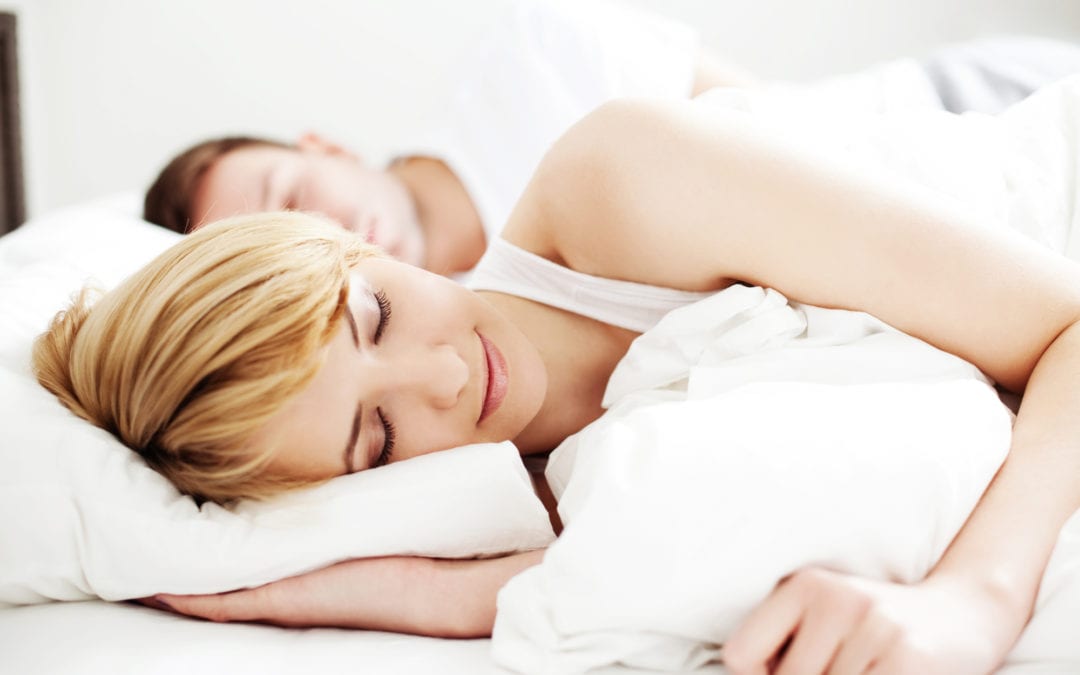Sleep apnea can be caused by a physical obstruction or by a misfire in the brain that shuts down breathing during the deepest sleep cycle. Whether your body is struggling to bring in air, such as when you’re snoring, or you just stop breathing, as in the case of central sleep apnea, your body is under a lot of stress.

Source of the Problem
Obstructive sleep apnea (OSA) is much more common than central sleep apnea, or the apnea that is caused by a shutdown of the breathing reflex in deep sleep. OSA can be caused by a variety of physical obstructions, including
- allergies
- adenoids
- obesity
Over time, untreated sleep apnea can shorten your life.
High Blood Pressure
Sleep apnea limits your oxygen intake, which forces your body to work harder to get poorly oxygenated blood around to your organs. Higher blood pressure is common among those with OSA. Once your blood is fully oxygenated, such as after you start using a CPAP machine, you may even be able to cut back on your blood pressure medications with your doctor’s guidance and approval.
Heart Disease
Sleep should be a time of rest for your body and brain. As you sleep, your body and brain shed toxins that are carried away by your blood. If your heart has to work harder to move poorly oxygenated blood around your body, your organs, including your heart, may be oxygen-starved.
Atrial fibrillation, or a fast, fluttering heartbeat that stresses the heart but doesn’t effectively move blood, is linked to sleep apnea. If you struggle with poor-quality rest such as severe snoring or breathing cessation, your body is likely going to be starved for oxygen.
Type 2 Diabetes
There is a strong link between obesity and Type 2 diabetes and being overweight and obstructive sleep apnea. If you’re not getting enough rest, your body may not be using insulin effectively.
Worse, mild sleep apnea can make you crave sugar and carbohydrates due to an increase in the production of the hormone ghrelin. High ghrelin levels crop up when your body is under stress. It makes sense; if you’re not sleeping well, your body is under pressure to get things done on less rest and lower energy, so it tells you to eat energizing foods for fuel. However, high levels of ghrelin can push you to make poor choices over time.
Immune System
Sleep apnea means that the time you spend sleeping isn’t as effective in protecting your health. You may be more at risk for infections, or your lower levels of energy may mean that a simple cold virus turns into pneumonia or bronchitis with frustrating regularity.
Heartburn, GERD, and Acid Reflux
If you have a history of peptic ulcer, heartburn, GERD or other failures at the top of the digestive system, your sleep apnea may be worse. A back-up of stomach acid in the esophagus can lead to laryngeal inflammation, and this inflammation can lead to apnea. If you wake up with heartburn or find that your voice is hoarse and raspy in the morning, reflux may be the problem and it can worsen sleep apnea.
Your Brain
Poor sleep can make you both grumpy and confused. Worse, apnea lowers your sleep quality. We need to get into deep sleep for our brains to fully clear out the toxins that build up over the course of a day. If you’re constantly jerking awake and having to roll over because your body goes into high alert because you’ve stopped breathing, you’re not getting into a deep sleep.
Apnea can also impact relationships. If your spouse can’t sleep because you’re snoring, they may wake you up, just be annoyed, or move to another room. Closeness in relationships is important; sleeping beside someone you love can give people a great deal of comfort. If your spouse can’t rest because of your obstructive apnea, it’s time to talk to your doctor.
Diagnosing Sleep Apnea
Getting a sleep study is a simple way to determine the source of your sleep apnea. To prepare,
- stop caffeine at noon on the day of the test
- no alcohol that evening either
- no naps before your study
- notify your doctor of any meds you’re on, whether sleep-related or not
You’re going to be fairly “wired up” during your study; your head, hands and legs will be monitored for brain activity and muscle movements. Your breathing will be monitored with a belt around your middle and snoring will be recorded.
This monitoring is critically important as the source of your apnea or and sleeplessness needs to be determined. If your problem is primarily related to the airway, you’ll know. If there’s a secondary concern related to limb movements because you have a pinched nerve in your back, treating that can also improve your sleep.
Reviewing Your Results
Once you know the results of your sleep study, you can discuss your options with a sleep apnea expert in New Jersey. Not everyone who has obstructive sleep apnea needs a CPAP machine; some find relief with a simple appliance to keep the lower jaw inline.
It’s critically important that you get an appliance or CPAP tool that works specifically for your problem. There are several over the counter tools that claim to stop snoring, but if your sleep apnea is related to your brain, an appliance won’t address the real problem and your health may still be at risk.
No matter your apnea source, getting a handle on the problem will improve your quality of life, help you rest more deeply, and boost your energy. Discuss your sleep concerns with your physician to see if apnea is a concern.
Leave a Reply